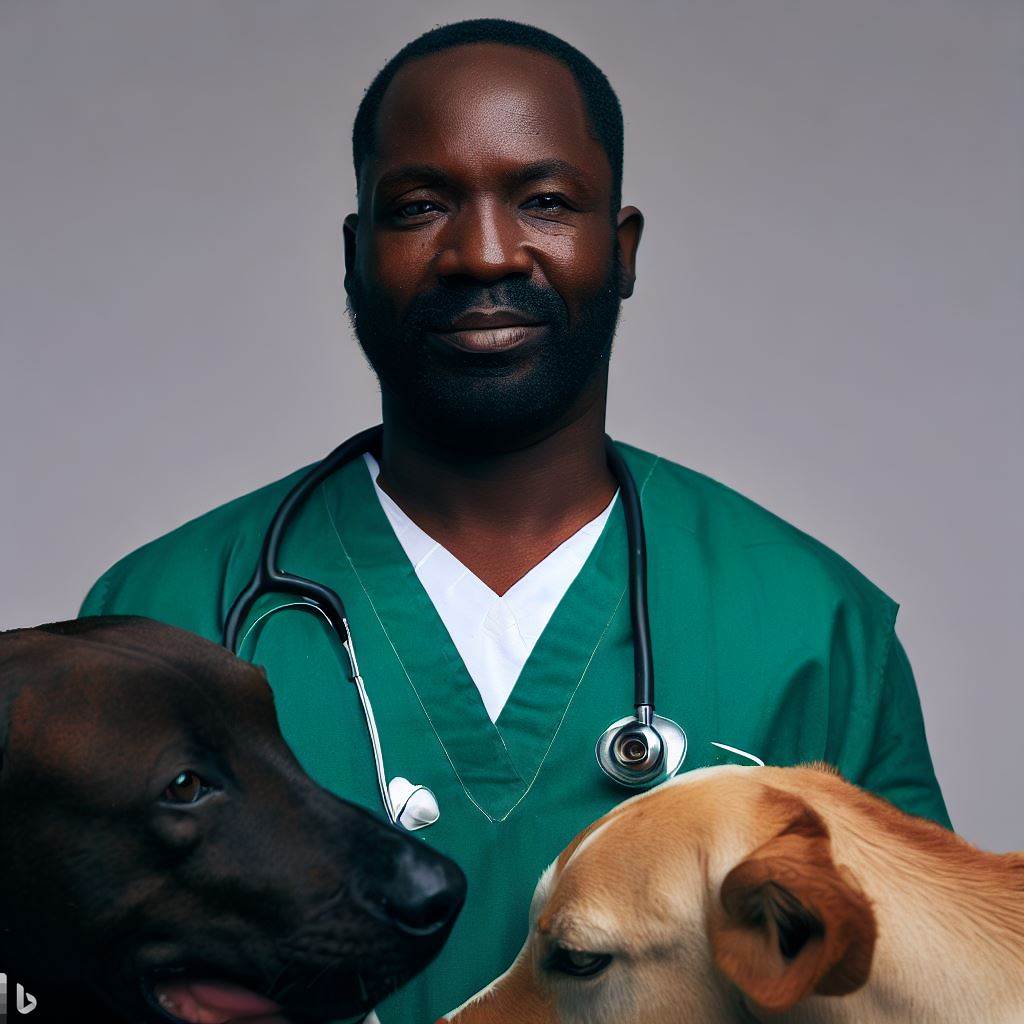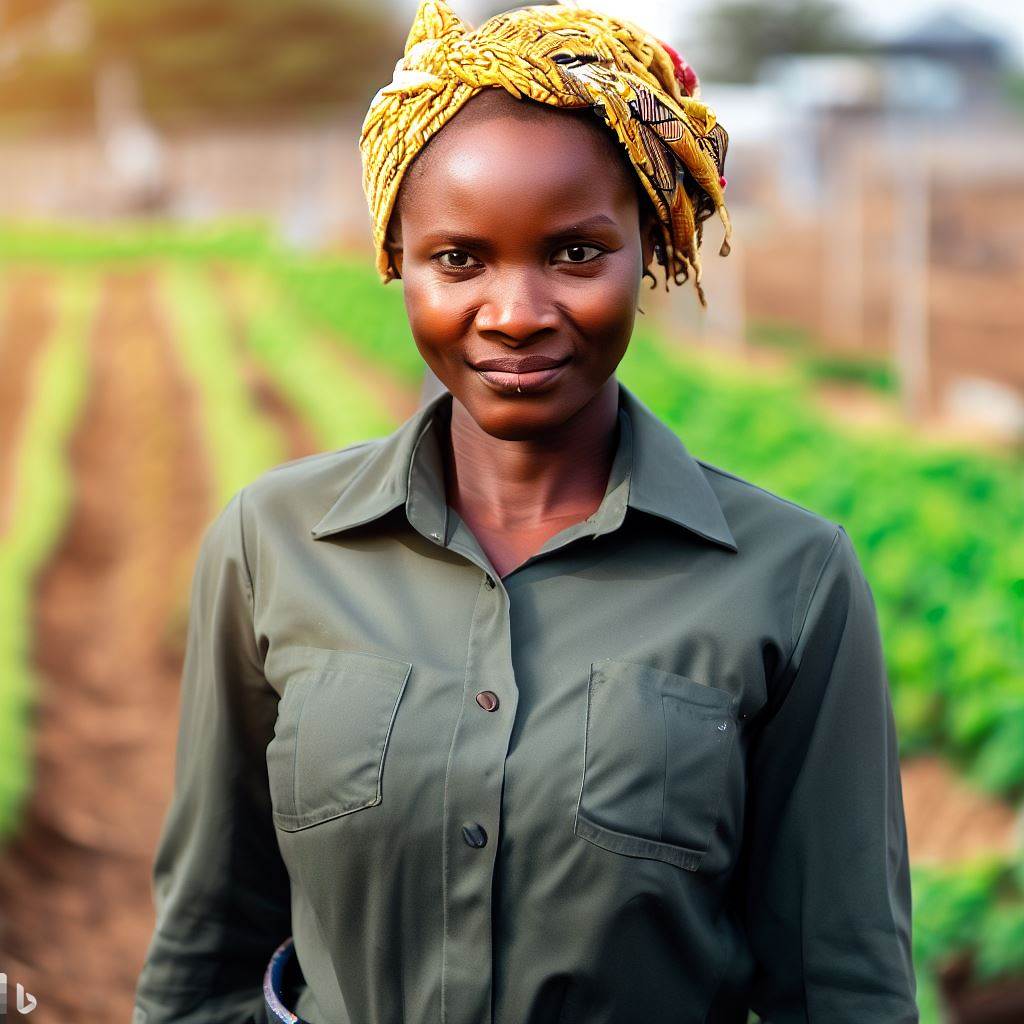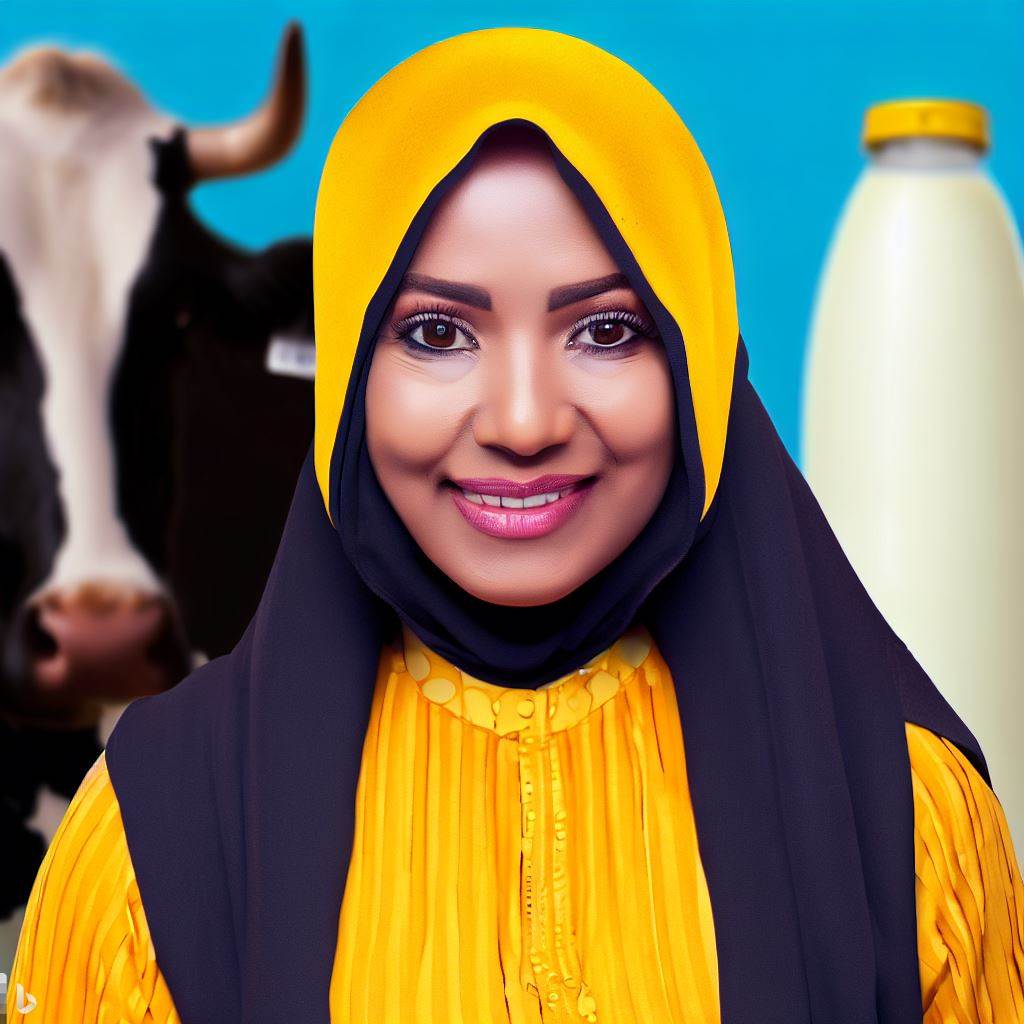Introduction
Promoting animal health in Nigeria is crucial for various reasons. The well-being of animals directly impacts human health, food security, and the economy.
Animal diseases can spread to humans, causing zoonotic diseases with severe consequences.
Moreover, animals play a vital role in the agricultural sector, providing meat, milk, eggs, and other products essential for sustenance.
Ensuring the health and productivity of livestock is essential for food security and economic stability.
The significance of veterinary practices in achieving animal health cannot be understated. Veterinary professionals play a critical role in preventing, diagnosing, and treating animal diseases.
They safeguard animal welfare, manage disease outbreaks, and promote preventive healthcare measures, such as vaccinations and proper nutrition.
Veterinary practices also contribute to the overall development of livestock production systems, enhancing productivity, profitability, and sustainability.
Furthermore, veterinary practices in Nigeria serve as a bridge between animal health and human health.
Through surveillance and disease control programs, veterinarians help prevent the transmission of zoonotic diseases, protecting both animals and humans.
They also contribute to public health through food safety measures, ensuring that animal products are safe for consumption.
Basically, promoting animal health in Nigeria is vital for the well-being of both animals and humans.
Veterinary practices play a crucial role in achieving this goal through disease prevention, diagnosis, and treatment.
By prioritizing animal health, Nigeria can bolster food security, economic stability, and public health.
Veterinary Practices in Nigeria
Overview of the current state of veterinary practices
- Veterinary practices in Nigeria play a crucial role in promoting animal health and welfare.
- The country has a significant number of veterinary clinics, hospitals, and professionals.
- Veterinary services are commonly available in both rural and urban areas of Nigeria.
- These practices offer a range of services including preventive care, diagnosis, and treatment of animal illnesses.
- The current state of veterinary practices in Nigeria reflects gradual progress and improvement over the years.
Challenges faced by veterinarians in providing adequate care
- Limited funding and resources pose significant challenges for veterinary practices in Nigeria.
- Shortage of skilled veterinarians restricts the availability and accessibility of quality care.
- Inadequate infrastructure and outdated equipment hinder the effectiveness of veterinary services.
- Lack of awareness among animal owners about the importance of regular veterinary visits affects preventive care.
- The high cost of veterinary drugs and vaccines limits their availability, especially in remote areas.
Importance of addressing these challenges for effective animal health promotion
- Addressing the challenges faced by veterinarians in Nigeria is essential for ensuring animal health and welfare.
- Adequate funding and allocation of resources can enable veterinary practices to provide better care.
- Recruiting and training more veterinarians will help increase access to veterinary services across the country.
- Investing in modern infrastructure and equipment will improve the quality and efficiency of veterinary practices.
- Public awareness campaigns highlighting the benefits of regular veterinary care can encourage animal owners to seek professional help.
- Government subsidies or programs can help reduce the cost of veterinary drugs and vaccines, making them more accessible.
Generally, veterinary practices in Nigeria serve a crucial role in promoting animal health.
Despite the challenges they face, such as limited funding, shortage of skilled professionals, and inadequate infrastructure, addressing these issues is vital for effective animal health promotion.
By providing adequate resources, training more veterinarians, improving infrastructure, and raising awareness about the importance of veterinary care, Nigeria can strive towards better animal health outcomes.
Read: The Impact of Farming on Nigeria’s Food Security
Role of Veterinarians in Animal Health Promotion
Duties and responsibilities of veterinarians
- Veterinarians have the duty to provide preventive care and medical treatment to animals.
- They are responsible for conducting thorough examinations and diagnosing various animal diseases.
- Veterinarians also perform surgeries, administer medications, and provide post-operative care to animals.
- They have the duty to educate animal owners on proper animal care and responsible pet ownership.
- Veterinarians play a vital role in the overall well-being and health promotion of animals.
How veterinarians contribute to preventing, diagnosing, and treating animal diseases
- Veterinarians actively engage in preventive measures such as vaccinations, deworming, and parasite control.
- Through regular check-ups, veterinarians can identify early signs of diseases and provide prompt and effective treatment.
- They conduct diagnostic tests and interpret the results to accurately diagnose animal illnesses.
- Veterinarians create treatment plans specific to each animal, prescribing appropriate medications and therapies.
- They also monitor the progress of treatment, make necessary adjustments, and provide follow-up care.
Importance of regular check-ups and vaccinations in maintaining animal health
- Regular check-ups help veterinarians detect underlying health issues before they become severe.
- Vaccinations prevent animals from contracting various contagious diseases and protect their overall health.
- Vaccines boost the immune system, reducing the severity of illnesses and increasing the chances of recovery.
- Regular check-ups and vaccinations contribute to the early detection and prevention of potential epidemics.
- By keeping animals healthy, regular check-ups and vaccinations promote a safer environment for both animals and humans.
How veterinarians educate animal owners on proper nutrition and care
- Veterinarians provide guidance on selecting appropriate diets to meet animals’ nutritional needs.
- They educate animal owners on portion control, feeding schedules, and the importance of a balanced diet.
- Veterinarians offer advice on proper grooming, exercise, and environmental enrichment for animals.
- They provide information on common hazards that may affect animals and how to prevent them.
- Veterinarians continuously educate animal owners on animal health and empower them to make informed decisions.
In general, veterinarians play a crucial role in promoting animal health in Nigeria.
They have diverse duties and responsibilities, which include preventive care, diagnosis, and treatment of animal diseases.
Regular check-ups, vaccinations, and proper nutrition are vital aspects in maintaining animal health, and veterinarians actively educate animal owners on these matters.
By fulfilling their role, veterinarians contribute to the overall well-being and improved quality of life for both animals and humans.
Read: Sustainable Farming Practices for Nigerian Farmers
Challenges and Solutions in Veterinary Practices
Key Obstacles Faced by Veterinary Professionals in Nigeria
- Limited access to essential veterinary supplies and equipment hampers effective animal healthcare.
- Insufficient infrastructure for veterinary clinics and laboratories restricts the quality of services.
- Inadequate veterinary education and training result in a lack of specialized expertise.
- Limited awareness among animal owners about the importance of regular veterinary care poses a challenge.
- High prevalence of zoonotic diseases increases the complexity of veterinary practice.
Lack of Adequate Funding and Resources for Veterinary Clinics
- Veterinary clinics in Nigeria often struggle to secure funds for maintaining essential facilities.
- Lack of financial support leads to outdated equipment and inadequate diagnostic capabilities.
- Insufficient resources hinder the ability to offer comprehensive veterinary services.
- The absence of sustainable funding models weakens the overall veterinary infrastructure.
- Inadequate funds also limit the availability of affordable veterinary care for low-income communities.
Importance of Government Support and Policy Reforms
- Government support is crucial for enhancing veterinary practices and addressing existing challenges.
- Implementation of policies aimed at animal health promotion can improve the overall veterinary sector.
- Adequate funding allocation and resource provision by the government are essential for clinics.
- Collaboration between the government and veterinary associations can lead to policy reforms.
- Government support can enable the development of robust surveillance systems for disease control.
Strategies to Improve Veterinary Practices
- Increase investment in veterinary education to enhance the quality of training provided.
- Establish public-private partnerships to overcome financial constraints in veterinary clinics.
- Develop awareness programs emphasizing the importance of regular veterinary care for animals.
- Strengthen collaboration between veterinary professionals and public health agencies.
- Improve access to essential veterinary supplies and equipment for effective disease management.
Essentially, veterinary professionals in Nigeria face numerous obstacles that hinder the delivery of optimal animal healthcare.
These challenges range from limited access to resources and funding constraints to insufficient expertise and awareness.
However, through government support, policy reforms, and strategic measures, the veterinary sector can be improved.
By investing in education, establishing partnerships, and promoting awareness, Nigeria can advance its veterinary practices and ensure the health and well-being of its animal population.
Read: Technological Innovations Changing Farming in Nigeria

Collaboration and Partnerships for Animal Health Promotion
Emphasizing the significance of collaboration between veterinarians, farmers, and government agencies
Collaboration between veterinarians, farmers, and government agencies is crucial for ensuring the promotion of animal health in Nigeria.
By working together, these stakeholders can pool their resources and expertise to develop effective strategies and interventions.
This collaboration allows for a coordinated approach to animal health promotion, ensuring that all sectors are working towards a common goal.
Veterinarians can provide their expertise in disease prevention and treatment, farmers can implement on-farm practices that promote animal health, and government agencies can provide necessary regulations and support.
Together, these stakeholders can address the various challenges faced in promoting animal health in Nigeria, such as disease outbreaks, poor infrastructure, and limited access to veterinary services in rural areas.
Successful initiatives and partnerships in Nigeria
Nigeria has witnessed several successful initiatives and partnerships that have significantly contributed to animal health promotion.
One such example is the partnership between the Nigerian Veterinary Medical Association (NVMA) and local farmers’ cooperatives.
Through this partnership, veterinarians provide training and education to farmers on animal husbandry practices, disease prevention, and proper nutrition.
They also conduct regular farm visits to monitor the health of animals and provide necessary treatments.
Another successful initiative is the collaboration between the Nigerian government and international organizations, such as the Food and Agriculture Organization (FAO) and the World Organization for Animal Health (OIE).
These organizations provide technical support, funding, and capacity building to improve veterinary services, strengthen disease surveillance systems, and develop policies and regulations for animal health promotion.
Importance of sharing knowledge and best practices within the veterinary community
Sharing knowledge and best practices within the veterinary community is essential for promoting animal health in Nigeria.
Veterinarians should actively participate in professional networks and organizations to exchange information and experiences.
By sharing their expertise and insights, veterinarians can learn from each other and adopt best practices in their own practices.
This collaboration also fosters innovation and encourages the development of new strategies and approaches to animal health promotion.
Moreover, sharing knowledge with farmers is equally important. Veterinarians can educate farmers on basic animal healthcare, preventive measures, and early disease detection.
This empowers farmers to take proactive measures in safeguarding the health of their livestock.
Discussion on the role of international organizations and NGOs in supporting animal health promotion efforts in Nigeria
International organizations and NGOs play a vital role in supporting animal health promotion efforts in Nigeria.
They bring in expertise, resources, and funding that help address the challenges faced by the veterinary sector.
These organizations collaborate with local veterinary associations and government agencies to develop and implement initiatives aimed at improving animal health.
They also provide training and capacity-building programs to veterinarians and farmers.
Furthermore, international organizations and NGOs assist in strengthening veterinary infrastructure, enhancing disease surveillance systems, and supporting research and development activities.
In short, collaboration and partnerships are essential for promoting animal health in Nigeria.
By emphasizing the significance of collaboration between veterinarians, farmers, and government agencies, highlighting successful initiatives and partnerships, sharing knowledge and best practices, and recognizing the role of international organizations and NGOs, Nigeria can continue to improve its veterinary practices and ensure the well-being of its animal population.
Read: Insights on the Salary Scale of Agricultural Operations Managers in Nigeria
Gain More Insights: Nigeria’s Dairy Industry: Exciting Career Prospects
Conclusion
Recap of the importance of promoting animal health through veterinary practices in Nigeria
Throughout this post, we have highlighted the critical role that veterinary practices play in promoting animal health in Nigeria.
The well-being of animals is closely linked to the well-being of humans, and it is crucial to prioritize veterinary care to ensure a sustainable future for both.
Call to action for individuals, communities, and government to prioritize and support veterinary care
It is not enough to recognize the importance of veterinary practices; action is needed.
As individuals, we must ensure that our pets and livestock receive regular veterinary care.
Communities should advocate for the establishment of veterinary clinics and collaborate with local veterinarians.
The government plays a key role in allocating resources and implementing policies that support and regulate veterinary practices.
Closing thoughts on the potential impact of improved veterinary practices on overall animal health and well-being in Nigeria
By investing in veterinary practices, Nigeria has the potential to greatly improve animal health and well-being.
This, in turn, will lead to a healthier human population, as zoonotic diseases are better controlled.
Additionally, proper veterinary care can contribute to increased agricultural productivity and food security.
It is time to prioritize and support veterinary care in Nigeria. Together, we can make a significant difference in the lives of animals and humans alike.




